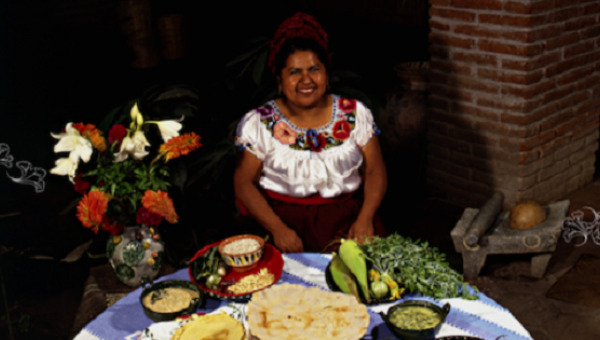Abigail Mendoza Ruiz, a well-known chef, is trying to preserve and enrich traditional Zapotec cuisine through the foods she serves in her restaurant, Tlamanalli. Her insistence on celebrating Zapotec customs impels her to serve only traditional foods in the restaurant she runs in Teotitlán del Valle, a town in Oaxaca that is also renowned for its weaving industry—and its tourists.

According to a news story last week, she opened the restaurant in 1990 with a commitment to serving the recipes of her mother and her aunt. The name of the restaurant suggests abundance or offering, and it refers to the Zapotec deity of the kitchen. Ms. Mendoza was clearly pleased that the fame she is gaining is focusing recognition on traditional Zapotec foods, because before she opened her restaurant “nobody cared.” Previously, people would question why they should even eat the indigenous foods. As she served the richness of the Zapotec cuisine, recognition from abroad came her way.
Another news story last week provided more details. Soon after she opened her restaurant in February 1990, Gourmet magazine visited. She was understandably thrilled when a copy of the magazine arrived in the mail some months later, even though she was unable to read the English language article about herself. A few years later, the New York Times reporter Molly O’Neill visited, and her story appeared on January 17, 1993.
Ms. Mendoza clearly served her a wonderful meal. “I dream of her pumpkin seeds roasted with chilies, her chicken broth with fresh corn and zucchini blossoms, her Oaxacan moles, the cazuela of white beans and tomatoes and fried white fish,” O’Neill wrote. The international praise has continued. Anthony Bourdain stopped by in 2014 to record an episode for his popular program “Parts Unknown.” A brief extract from the show on YouTube gives an impression of the quality of the food—and of the work that Ms. Mendoza and her sister do to prepare it.
Ms. Mendoza’s commitment to Zapotec foods began in the late 1960s when she was just five years old, helping her parents in their kitchen by husking corn. Later, she learned to make tortillas. She was not turned on by cooking at first but she became increasingly fond of it. She learned by watching her mother and her aunt as they worked.
With the support of her family, she started the design and construction of her restaurant. She had trouble getting the new facility built the way she wanted because a contractor didn’t complete his work. Evidently, working for a woman was contrary to his beliefs. She turned to a friend of her father’s to finish the job; he was willing to sign a contract with her and resume the work. While the restaurant was under construction, she operated a small food stand next to it so she could perfect her recipes. It took her about six years to complete Tlamanalli exactly as she envisioned it. She wanted the menu and the kitchen to be just right—perfect representations of Zapotec culture.